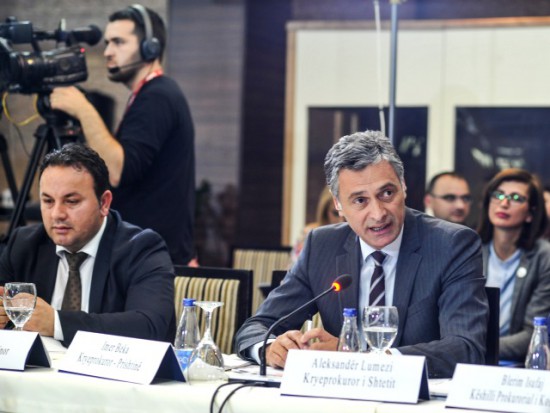Corruption Cases Left to Expire Kosovo, Report
At least 22 corruption cases were left to expire in the Kosovo justice system in 2015, a BIRN report found, and a much larger number of corruption cases were transferred from one year to the next.
Kosovo General Chief Prosecutor, Aleksander Lumezi, warned that any prosecutor who delays corruption cases will face disciplinary measures. Photo: BIRN/Petrit Rrahmani
A year-long monitoring of the Kosovo judiciary conducted by BIRN Kosovo found that about 10 per cent of corruption cases expired in 2015 because they were left unattended to, mainly because of delays by the prosecution.
When BIRN asked the courts in Kosovo to supply the number of these expired cases, the information was not made available, which prompted an independent investigation. This found that at least 22 corruption cases expired that year. As the courts received an average of about 200 such cases during the last two years, 22 in one year acounts for about 10 per cent, which is seen as high.
“There were cases when prosecutors did not meet deadlines to complete the procedures in several cases,” Petrit Kryeziu, who led the BIRN monitoring unit, said. Corruption cases scored a high rate of transfer to the following year.
While the courts in Kosovo received a total of 258 new corruption cases in 2014, they actually worked on 655 cases, as this included hundreds of inherited cases. Of this number, 229 were resolved and 426 remained unsolved.
In 2015, there were 153 new corruption cases of which the courts resolved 121. However, they also transferred 423 cases to 2016.
Kryeziu said there were clashes between the prosecution and the courts over some of these cases.
“While judges complain that prosecutors’ indictments are unfounded, prosecutors complain that judges deliver soft sentences for corruption cases,” he explained.
Kosovo’s General Chief Prosecutor, Aleksander Lumezi, said that if it is proven that corruption cases are being left to expire, the respective prosecutor will become subject to disciplinary procedures.
“There is corruption in Kosovo, if not on the scale as is commented, so it is imperative for justice institutions to conduct analysis on real corruption and the perception of citizens,” Lumezi said.
The yearly report on the monitoring of justice system in Kosovo is the ninth of its kind. Several improvements were also found for 2015, however, especially with regard to judicial institutions’ transparency and openness to public inquiries.
13 May 2016

